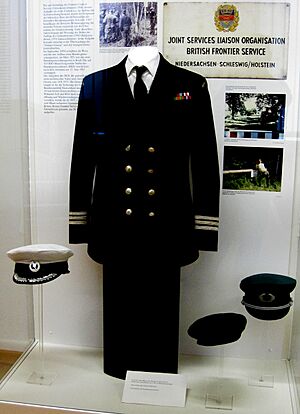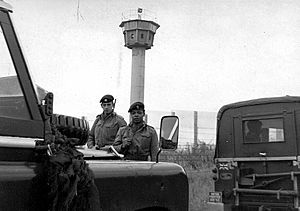British Frontier Service facts for kids
Imagine a special group of people who watched over borders! The British Frontier Service (BFS) was a British government team. They worked in West Germany from 1946 to 1991. Their job was to keep an eye on the borders. They helped British soldiers and their families move around. They also watched for problems and helped solve arguments at the border. The BFS stopped working after German reunification, when East and West Germany became one country again.
Contents
How the British Frontier Service Started
After World War II ended, British soldiers were placed along Germany's borders. They were in the British zone. Their job was to control people crossing and stop illegal smuggling.
In 1946, civilians took over this job. This new group was called the Frontier Control Service. It was part of the British Control Commission in Germany. Over the years, its name changed a few times:
- Frontier Control Service (1946–1949)
- Frontier Inspection Service (1949–1955)
- British Frontier Service (1955–1991)
Many BFS members used to be in the Royal Marines, the Royal Navy, or the British Army. The first leader was Captain Guy Maund from the Royal Navy. He helped create the BFS's special naval-style uniform. BFS staff were given honorary Army ranks. The director was like a full colonel.
The BFS started with 300 people. They also had help from German customs officers. These German officers had been prisoners of war. They were released to help with daily border checks. The BFS focused on stopping smuggling and illegal crossings.
At first, the BFS mainly watched Germany's borders with Belgium, Denmark, and the Netherlands. The border with the Soviet occupation zone (East Germany) was mostly unguarded. This changed after the Berlin Blockade in 1948-49. More illegal goods were coming from the Soviet zone. So, the BFS and the new West German customs service (Zollgrenzdienst) moved to the inner German border. This border stretched about 660 kilometres (410 mi) from Lübeck to Göttingen.
Changes to the BFS's Role
In 1955, West Germany became an independent country. The British Control Commission closed down. The BFS changed a lot. It moved from the British Foreign Office to the War Office. Later, it was part of the Ministry of Defence. It stayed a civilian group.
The BFS staff was cut from 300 people to just 38. They lost many of their main duties. Only a few staff worked on the eastern border. Most worked at crossing points. They helped British armed forces and their families move around. This was part of an agreement with West Germany.
The BFS headquarters moved to Wahner Heide, near Bonn. This is now Cologne Bonn Airport. It was managed as part of a larger British group. Operations on the eastern border were run from Hannover. Other offices were in Berlin, Düsseldorf, and Helmstedt. Helmstedt was near a main border crossing called Checkpoint Alpha.
The BFS changed again in 1967. It became a permanent part of the Civil Service. In 1972, East and West Germany agreed to recognize each other. The British government thought it was no longer responsible for the inner German border. They even thought about getting rid of the BFS completely.
However, they decided the BFS would keep a small role. It would mostly connect with German border agencies. The staff was cut to 16 members. Only the British Frontier Post at Helmstedt stayed open, with four people. The BFS finally closed on May 28, 1991. This happened after Germany became one country again.
BFS on the Ground
Between 1955 and 1972, the BFS was very important on the inner German border. Their officers went to border incidents or unusual events. They helped calm arguments and gave a British view of what was happening.
They dealt with many different situations. These included people escaping over the East German border. They also handled East German border markers that were moved. Or attempts to block West German boats on the Elbe river border. West German customs or border police (Bundesgrenzschutz) would talk directly to the East Germans. The BFS officer would give advice.
The BFS also helped the British Army patrol the inner German border. BFS staff were often seen guiding British Army units. They showed them the way along the southern part of the British zone. This ran from Lauenburg to Schmidekopf. The British Army didn't patrol the shorter northern part. But the BFS would visit it sometimes.
The Times newspaper described the BFS as "delightful, perhaps unique." They had patrol cars with radios and British flag badges. They used military language. It seemed like an old-fashioned imperial force, watching over a new kind of border.
Notable BFS Personnel
Some BFS members were honored for their work. Jack Owen, a BFS officer and former Royal Marine, received an MBE award in 1963. This was after a tense event at Bohldamm, near Lüchow.
The border there followed a stream. But its exact location was argued. West Germans thought the border was on the far side of the stream. East Germans thought it was in the middle. An old footbridge crossed the stream. East Germans had blocked it with a movable barbed wire barrier.
One day in 1962, the East Germans moved the barrier to the middle of the bridge. West German guards protested. The situation got worse when East Germans warned they would shoot anyone who touched the barrier. They even brought machine guns and armored cars. The West Germans called for BFS help and a British Army section.
Jack Owen bravely walked onto the bridge with two British soldiers. He carried the barrier back to the East German side. He then stood by it for eight hours to make sure it wasn't moved again.
Tommy Jones, a former military police officer, became well known. He guided Western journalists and visitors along the inner German border. He escorted about 4,000-5,000 visitors each year. He said he "never [got] frustrated." He felt it was important to show people the border.
Jones arrived in Germany in 1945 during World War II. He stayed there for 45 years. He joined the BFS in 1960. He moved to Helmstedt in 1974. By 1983, he became the head of the BFS, when only four people were left.
In January 1990, he also received an MBE. He then retired to become a Chelsea Pensioner. His departure was noticed by both West and East German border guards. He said that for 16 years, East German guards never spoke to him. They only took pictures. But when the border opened, they wanted to shake his hand. He didn't feel like it.
 | Valerie Thomas |
 | Frederick McKinley Jones |
 | George Edward Alcorn Jr. |
 | Thomas Mensah |



